Breastfeeding guilt experienced by half of mothers - BBC survey
Half of mothers who responded to a new survey said they felt they let their baby down when they struggled to breastfeed.
More than a third of the 1,162 respondents to the UK-wide poll, commissioned by BBC Radio 4's Woman's Hour and BBC Radio Sheffield, revealed they felt ashamed for giving their child formula.
Four new mums talk about the struggles they faced and how they coped.
'You feel like you are giving them poison'
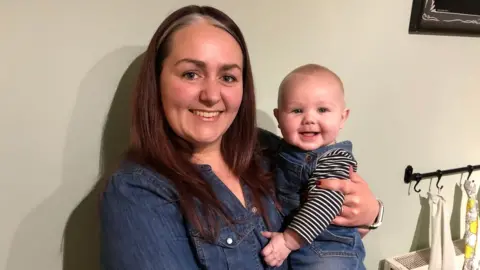
Amy Quick, 31, had always thought she would exclusively breastfeed her now five-month-old son Oliver.
"He latched himself about 40 minutes after he was born," she said. "I felt like we'd got off to a really good start."
But after three days Oliver's weight dropped by more than 10% and she began topping up his feeds with formula. By day five she had been referred to a feeding specialist.
"I got a prescription for Domperidone, it ups your levels of prolactin [the hormone responsible for milk production] to try and get your milk to come in.
"I was on that, I also got fenugreek - I was eating oats till they were coming out of my ears. All these different supplements I was trying but nothing was really working."
She said she felt "ashamed" at feeding Oliver with formula.
"You feel like you are giving them poison," she said. You get told breast is best, so when you can't do it it's a bit of a hit to the system.
"Now, I look at it all and I wonder what I got myself so worked up about, because he's a healthy, happy little baby."
'Bottle-feeding was the best thing ever'
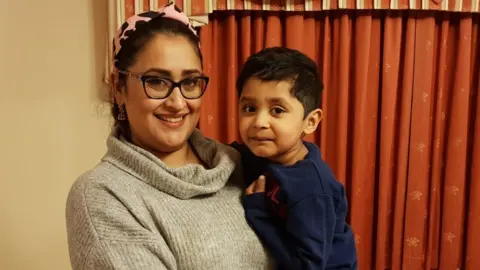
Nazneen Mahmood, 34, said feeding her son Rehan formula was "the best thing ever" but felt it had never been presented as an option.
"The first night he just cried and I didn't know what to do," she said.
"I was willing myself to get a couple of drops out but there was nothing in there - there was nothing. I just couldn't.
"After I went home my mum marched me to the supermarket, bought me formula, made a bottle and sent me upstairs to have a bath while she fed him, and that was that.
"I felt like a failure. I felt like the worst person in the world. But [later] I didn't really care. I just thought: 'He's feeding, he's feeling better, he's putting weight on'.
"I thought: 'Why is this a secret? Why did no-one tell me that this [bottle-feeding] was the best thing ever?' And it really was the best thing ever.
"I feel like people need to be honest. Don't tell parents, mums especially, that breastfeeding is easy because it's hard and it's lonely and it's painful.
"If it's easy, why are there so many women who have said: 'I've had the worst time?'"
'Breastfeeding saved me'
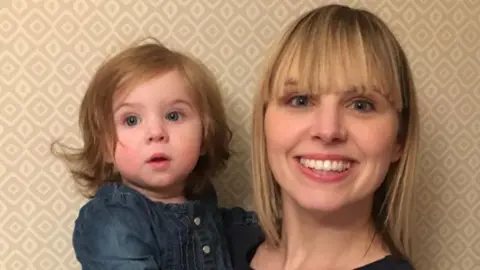
Mother-of-three Natalie Bayarri, 34, said she wanted to breastfeed her firstborn, and after having an emergency C-section she felt even more determined.
"I just felt that my body has just absolutely messed up, this was not what was meant to happen and I was adamant that I was going to breastfeed so I felt like I could redeem myself," she said.
"I was very determined but my milk didn't come in for three days, which is very normal, but my baby was losing weight and it was all very stressful.
"I was being advised to give him top-ups [with formula] but I was quite pigheaded and just said no.
"I think if I had not been able to breastfeed him after the birth I'd had, I would have found it very difficult to find my identity as a mother.
"I think I could have really struggled mentally with that, so I feel that the breastfeeding kind of saved me."
She has since gone on to breastfeed her other two children.
"I can't quite imagine not doing it," she said.
"Sometimes it drives me crazy; it can be quite restrictive and my social life has definitely taken a massive dip in the last few years, but I just feel it is so precious and magical: a brilliant gift I can give my kids."
'That's the sound of your baby starving'
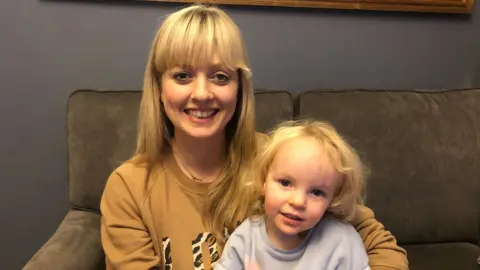
Rebecca Dudley, 34, said she was "110% determined" to breastfeed her daughter but after an unplanned homebirth and difficulties feeding she switched exclusively to formula.
"I just felt that breastfeeding was the only thing really and I thought: 'When this baby comes it's just going to happen'.
"They kept putting her on me and kept putting my nipple to her and she would sort of latch on and she would suck a couple of times and then nothing.
"I was really confident that it would happen. I just thought everything would be fine.
"But then we had to stay in [hospital] overnight and she absolutely refused to come anywhere near me.
"She continued to refuse to feed and then a healthcare support worker or somebody came and said: 'That's the sound of your baby starving - what are you going to do?'
"They would say: 'Look, she is so hungry, she is starving, you are going to have to do a top-up feed, you are going to have to give her formula'.
"I just wanted to be at home and they said the only way I'd be able to leave is if I said that I would bottle-feed.
"I felt elated to start with that I had made a decision but within half an hour I felt this huge sense of guilt - shame, even, of how I was going to be viewed by other people. I just felt like a failure.
"At no point did anyone sit down and say to me: 'You've lost so much blood because you haemorrhaged and that's potentially a reason why your milk isn't coming'.
"All throughout this I just thought it was me not being able to do it."

Breastfeeding guidance
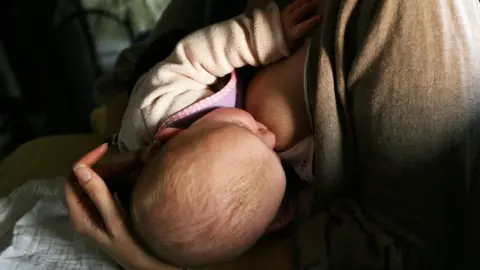 Katie Collins/PA
Katie Collins/PAThe World Health Organisation recommends breastfeeding exclusively for the first six months, and continued breastfeeding along with appropriate complementary foods up to two years of age or beyond.
However, in June 2018 the Royal College of Midwives guidance published new guidance for mothers, saying the decision to breastfeed - or not - "is a woman's choice and must be respected".
It said that while it deemed the exclusive use of breast milk the "most appropriate method of infant feeding" for the first six months, what was most important was that parents made an informed decision.

The findings of the poll will be discussed live on Woman's Hour on Tuesday 29 January with a panel of guests and throughout the week on BBC Radio Sheffield.
On Wednesday 30 January a phone-in will be broadcast on both BBC Radio 4 and BBC Radio Sheffield from 10:00 GMT.
